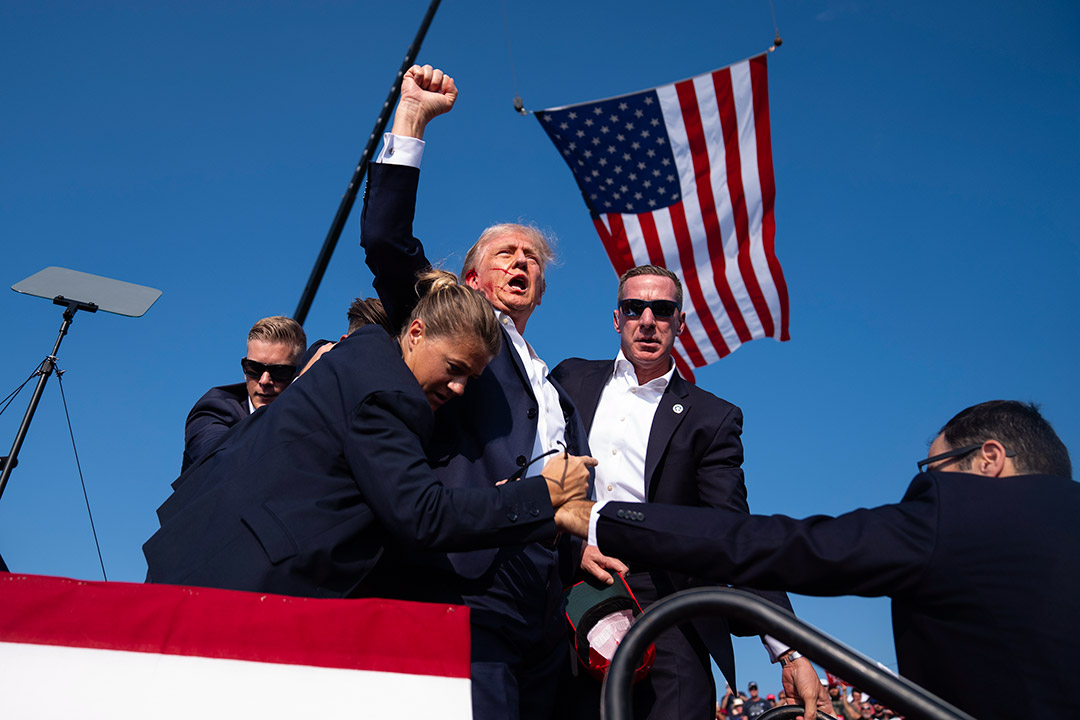Alumnus captures iconic moment on 2024 presidential campaign trail
Evan Vucci/Associated Press
RIT alumnus Evan Vucci took this photo of former President Donald Trump moments after a failed assassination attempt. Vucci said that when he heard the gunshots, his brain went on autopilot and he immediately jumped into action.
The duty of a photojournalist is to document current events as they unfold and act as the “eyes of history,” according to Evan Vucci ’00 (professional photographic illustration).
That belief helped Vucci keep his focus when he ran toward the danger on July 13 to photograph former President Donald Trump moments after a failed assassination attempt at his presidential campaign rally in Butler, Pa.
“The minute I heard the shots, I knew that this would be one of the most important things that I’d ever document,” said Vucci. “Your responsibility as a photojournalist is to be where the action is, and when the shots happened I told myself that I had to be on the top of my game to get the job done.”
Vucci has worked at the Associated Press (AP) for 21 years and currently serves as its chief photographer in Washington, D.C. He covers news surrounding the White House and, in an election year like 2024, he documents news relating to the presidential candidates. He was responsible for AP’s photography coverage of the Republican National Convention, President Joe Biden’s announcement that he would withdraw from the 2024 presidential race, and more.
The photo Vucci took of Trump raising his fist in the air quickly dominated the media landscape, and was featured as the cover photo of an issue of Time magazine. It also became a cultural icon and gained the attention of people across the country and globe, with some going as far as to get tattoos of the image.
Before the shots were fired, Vucci was photographing from the back of the photographer area right in front of the rally stage using a long lens. Once he realized what was happening, he moved closer to the stage while taking photos with a wide angle lens. Trying to anticipate the route the Secret Service would take to bring Trump to safety, he ran to a set of stairs on the side of the rally stage. It was in those moments that he captured the photo of Trump with his fist raised in the air.
Many have asked how he maintained his composure to capture such a dynamic and well-composed image.
“Having all of these experiences under my belt really allows me to stay calm and stay present in the moment. You don’t want to run around pointing your camera at everything, you want to be thoughtful with what you’re doing,” he said. “While I was photographing, I was telling myself, ‘hey man, just stay calm and slow down. Be purposeful.’”
This is not the first time Vucci’s photos have gained national—and international—attention. In addition to his work being regularly featured in national news outlets, Vucci was part of a team of AP photographers that was awarded a 2021 Pulitzer Prize for a collection of compelling photographs from multiple U.S. cities that cohesively captured the country’s response to the police killing of George Floyd.
Regardless of accolades or the popularity of specific photographs, Vucci said that it isn’t pride over any singular photo that pushes him forward or motivates him, but something more personal.
“AP has a long, distinguished history of photography going back to the very beginnings of the organization. I’m most proud that, when it was all on the line, I was able to hold that standard and rise to the level of what’s expected of me,” he said. “It’s not the single images or moments, it’s the standard of excellence that I’m trying to consistently uphold. That’s what I’m most proud of when I look back on my career.”
Vucci said that retired RIT Professor Bill DuBois was the reason he fell in love with photography, noting that DuBois’ passion and dedication to students inspired him. Today, when work allows, Vucci relishes the opportunity to work with current RIT students and give them advice as they look toward starting their own careers.
“I think having a mentor is invaluable, especially for a student or young photographer. It's important to connect with the people who are working at the level you want to be at and have laid that foundation for you so you can follow in their footsteps. That’s what I certainly did,” said Vucci. “If you’re willing to put in the work and take those lessons from them, you can make it far.”













